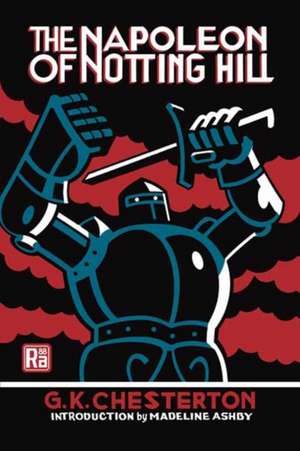The Napoleon of Notting Hill
Autor G. K. Chesterton, Madeline Ashbyen Limba Engleză Paperback – aug 2023
When Auberon Quin, a prankster nostalgic for Merrie Olde England, becomes king of that country in 1984, he mandates that each of London’s neighborhoods become an independent state, complete with unique local costumes. Everyone goes along with the conceit until young Adam Wayne, a born military tactician, takes the game too seriously . . . and becomes the Napoleon of Notting Hill. War ensues throughout the city—fought with sword and halberd!
G. K. Chesterton (1874–1936) was an English author, poet, critic, and newspaper columnist known for his brilliant, epigrammatic paradoxes. His best-known character is the priest-detective Father Brown, featured in over fifty stories published between 1910 and 1936, who solves mysteries and crimes thanks to his understanding of spiritual and philosophic truths; and his best-known novel is The Man Who Was Thursday (1908), a metaphysical thriller. In addition to The Napoleon of Notting Hill, his first novel, he wrote several other near-future satires of England.
Preț: 63.48 lei
Preț vechi: 72.91 lei
-13% Nou
Puncte Express: 95
Preț estimativ în valută:
12.15€ • 12.99$ • 10.13£
12.15€ • 12.99$ • 10.13£
Carte disponibilă
Livrare economică 27 martie-03 aprilie
Livrare express 12-18 martie pentru 29.31 lei
Preluare comenzi: 021 569.72.76
Specificații
ISBN-13: 9780262546416
ISBN-10: 0262546418
Pagini: 248
Ilustrații: 1 b&w illustrations
Dimensiuni: 133 x 199 x 17 mm
Greutate: 0.24 kg
Editura: MIT Press Ltd
ISBN-10: 0262546418
Pagini: 248
Ilustrații: 1 b&w illustrations
Dimensiuni: 133 x 199 x 17 mm
Greutate: 0.24 kg
Editura: MIT Press Ltd
Notă biografică
G. K. Chesterton (1874–1936) was an English author, poet, critic, and newspaper columnist known for his brilliant, epigrammatic paradoxes. His best-known character is the priest-detective Father Brown, featured in over fifty stories published between 1910 and 1936, who solves mysteries and crimes thanks to his understanding of spiritual and philosophic truths; and his best-known novel is The Man Who Was Thursday (1908), a metaphysical thriller. In addition to The Napoleon of Notting Hill, his first novel, he wrote several other near-future satires of England.
Madeline Ashby is the author of the Machine Dynasty series and the novel Company Town, as well as a contributor to How to Future: Leading and Sense-Making in an Age of Hyperchange. She has developed science fiction prototypes for Changeist, the Institute for the Future, the Smithsonian Institution, SciFutures, Nesta, the World Health Organization, the World Bank, the Atlantic Council, and others.
Madeline Ashby is the author of the Machine Dynasty series and the novel Company Town, as well as a contributor to How to Future: Leading and Sense-Making in an Age of Hyperchange. She has developed science fiction prototypes for Changeist, the Institute for the Future, the Smithsonian Institution, SciFutures, Nesta, the World Health Organization, the World Bank, the Atlantic Council, and others.
Cuprins
Series Foreword ix
Introduction: Dystopias Are Problems Plus Time xv
Madeline Ashby
Book I
I Introductory Remarks on the Art of Prophecy 3
II The Man in Green 9
III The Hill of Humor 31
Book II
I The Charter of the Cities 43
II The Council of the Provosts 55
III Enter a Lunatic 69
Book III
I The Mental Condition of Adam Wayne 87
II The Remarkable Mr. Turnbull 103
III The Experiment of Mr. Buck 115
Book IV
I The Battle of the Lamps 135
II The Correspondent of the "Court Journal" 151
III The Great Army of South Kensington 163
Book V
I The Empire of Notting Hill 189
II The Last Battle 205
III Two Voices 215
Introduction: Dystopias Are Problems Plus Time xv
Madeline Ashby
Book I
I Introductory Remarks on the Art of Prophecy 3
II The Man in Green 9
III The Hill of Humor 31
Book II
I The Charter of the Cities 43
II The Council of the Provosts 55
III Enter a Lunatic 69
Book III
I The Mental Condition of Adam Wayne 87
II The Remarkable Mr. Turnbull 103
III The Experiment of Mr. Buck 115
Book IV
I The Battle of the Lamps 135
II The Correspondent of the "Court Journal" 151
III The Great Army of South Kensington 163
Book V
I The Empire of Notting Hill 189
II The Last Battle 205
III Two Voices 215
